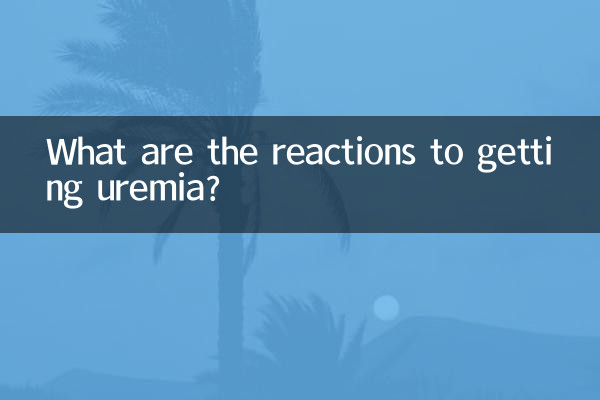What are the reactions to getting uremia?
Uremia is the end stage of chronic kidney disease. Due to severe renal failure, metabolic waste and toxins in the body cannot be discharged normally, causing a series of clinical symptoms. Understanding the early reactions and typical symptoms of uremia will help you seek medical attention and intervene in treatment in a timely manner. The following are common reactions and information about uremia.
1. Common symptoms of uremia

| Symptom classification | Specific performance | Possible reasons |
|---|---|---|
| digestive symptoms | Loss of appetite, nausea, vomiting, bad breath (urine smell) | Accumulation of toxins irritates the gastrointestinal tract |
| neurological symptoms | Fatigue, insomnia, difficulty concentrating, numbness or twitching of limbs | Electrolyte imbalance and toxins affect neurological function |
| cardiovascular symptoms | High blood pressure, palpitations, chest pain, edema (especially in the lower limbs) | Water and sodium retention and anemia lead to increased cardiac load |
| skin symptoms | Dry skin, itching, hyperpigmentation | Urea is excreted through sweat and irritates the skin |
| respiratory symptoms | Deep and rapid breathing (acidosis), shortness of breath | Metabolic acidosis and pulmonary edema |
2. Laboratory test indicators of uremia
| Check items | abnormal behavior | clinical significance |
|---|---|---|
| Serum creatinine (Scr) | Significantly elevated (men>442μmol/L, women>353μmol/L) | Severely impaired kidney function |
| Blood urea nitrogen (BUN) | >20mmol/L | azotemia signs |
| Glomerular filtration rate (GFR) | <15mL/min | end stage renal disease criteria |
| electrolyte | Hyperkalemia, hypocalcemia, hyperphosphatemia | Metabolic disorders |
| Hemoglobin (Hb) | <100g/L (renal anemia) | Erythropoietin deficiency |
3. Causes of uremia and high-risk groups
Uremia usually develops gradually from chronic kidney disease (such as diabetic nephropathy, hypertensive nephropathy, chronic nephritis). The following groups of people need to be extra vigilant:
4. How to prevent and treat uremia?
1.early intervention: Control blood sugar and blood pressure, and monitor kidney function regularly.
2.Diet management: Low-salt, low-protein, phosphorus-limited diet to reduce the burden on the kidneys.
3.alternative treatment: Dialysis (hemodialysis or peritoneal dialysis) or kidney transplantation are the main treatments for end-stage disease.
4.Complication management: Correct anemia, regulate calcium and phosphorus metabolism, and improve cardiovascular health.
Conclusion
The symptoms of uremia are complex and systemic, and early identification and active treatment of the primary disease are key. If you experience unexplained fatigue, edema, or decreased urine output, it is recommended to seek medical attention as soon as possible to check your kidney function to prevent the condition from deteriorating to an irreversible stage.

check the details

check the details